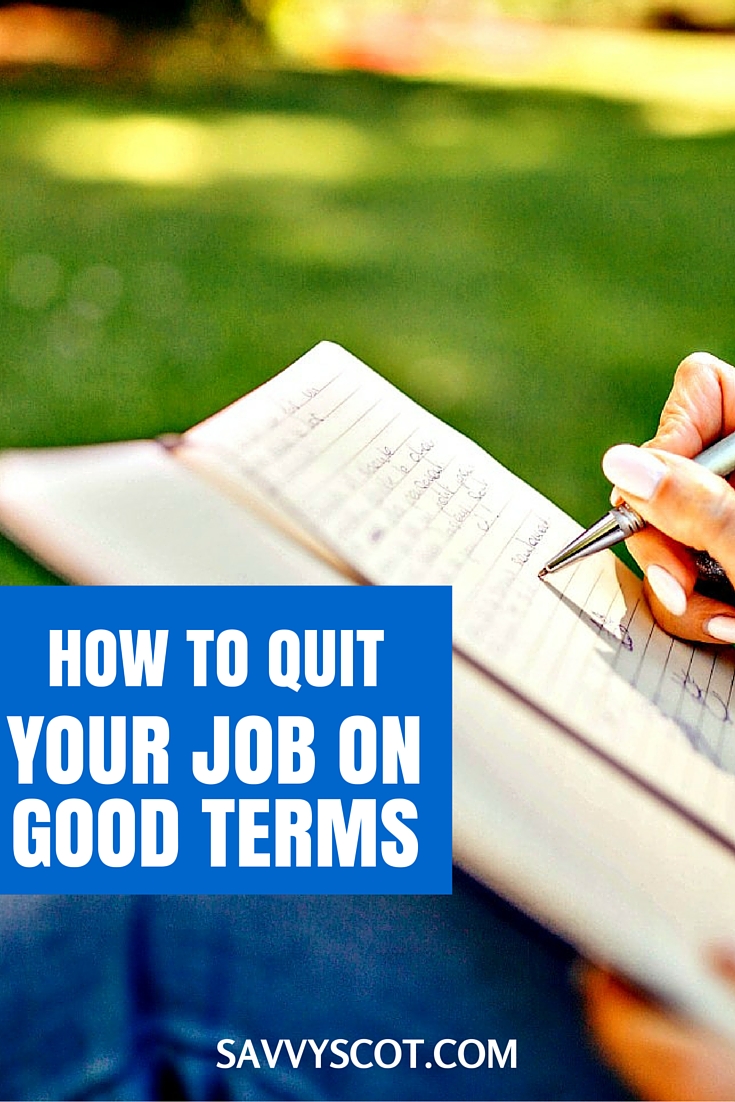Everything in life is about timing. When you get married, when you get pregnant, when you buy your first house, when you quit your job. Yes, most of us will quit a job at some point in our lives. Gone are the days of our grandparents when a person did the same job for 40 years.
So to prepare you for such an occasion, I’ll outline how to bug out in an effective manner. I did this just a few years ago. My escape went very smoothly. Follow these steps…
Nail the Timing
Plan your exit for a time that’s amicable for all. Preferably, quit during a slow time. Doing this will ensure your colleagues aren’t scrambling after your exit.
But perhaps you got another job or your own business has taken off very suddenly. Then you can’t plan your last date very well. What to do then is to give as much notice as possible. Two weeks is a good amount. This will give you enough time to say your goodbyes and wrap up your loose ends. It’ll also give the employer time to try to replace you. Not that you can be replaced… 🙂
Put It in Writing
Most employers require your resignation in writing. Then you can’t come back and claim you never quit like George did on Seinfeld. The best thing to do is look up company policy on how to quit. It’ll probably say you need to put it in writing and email it within a day of verbally saying you quit. Resignation letters needn’t be elaborate. Simply stating your exit date is good enough most of the time.
Inform Your Mates First
You probably have some people around the office you like more than others. Tell them ASAP. Pretty quickly, everyone will find out you’re leaving. Make sure to tell them how much you’ve liked working with them. But you needn’t justify why you’re leaving. I’ve found it’s best to just leave without saying anything negative about the job. Remember, those colleagues are staying. They don’t need to hear about the fact that they must remain.
Get on the Phone to Your Clients
Call those you care about who are outside of your organization. Tell them when you will be leaving. No need to go into details about why you will be leaving. If you’re in a customer service position, give them the contact information for who they can reach from now on. Make sure the transition goes smoothly. This is especially important if you’ll be staying in the same industry. You don’t want to tarnish your reputation.
Clean out Your Desk ASAP
Before I quit, I actually bean discretely cleaning up my desk weeks in advance. I cleaned out things like drawers and cabinets. I cleaned up my computer files as well. This is really helpful. It gets yourself in the mindset that you are truly leaving. For this brief period of time, you can say goodbye to the job on your own. It also will make you more available once you do quit. Because those last few weeks will likely be busy.
This also just pan convenient. This will keep you from jam-packing your car (or bike 🙂 ) full of stuff on your final day. Playing tetris will banker’s boxes is no fun. You also won’t need to make such a commotion on your last day. That’ll disturb the office workflow and your boss won’t like that. You understand. Packing early also ensures you won’t leave anything behind. That would be extremely awkward.
Keep in Touch with Your Favorite Colleagues
You’ll have probably met some pretty awesome people. Make sure to stay in touch. They will want to stay in touch. They can talk with you about their escape if they don’t like the job. Or they can keep you in touch with that employer, should you do business with them in the future. Plus, those colleagues may just be your friends. Keeping in touch with friends is a no-brainer.
Be Positive
Only say good things about your boss, employees and former employer. If you say anything negative, it doesn’t help you. It hurts you. It tells people that you put up with a messy organization for as long as you were there. You’re telling everyone you made a mistake by accepting that job offer.
I have to laugh when someone tells me their boss is an idiot. I think, “You think he’s an idiot? You’re the one working for him!”
Forget All of This
Maybe forget everything I just said. I’ve read a few books where the author suggests a person should burn all their bridges. That’ll ensure they never go back to the job they once quit. This kind of makes sense. If you leave the door open, you may scurry back inside. You may get scared if your business isn’t as easy as you planned it would be. Or maybe your new employer isn’t so great so you go running back to the former. I would estimate that that is nearly always a mistake.
Congratulations.
Bio:
Will Lipovsky is a personal finance freelance writer and internet marketer. His most embarrassing moment has been saying to a Microsoft executive, “I’ll just Google it.” You can get in touch with Will at FirstQuarterFinance.com.


